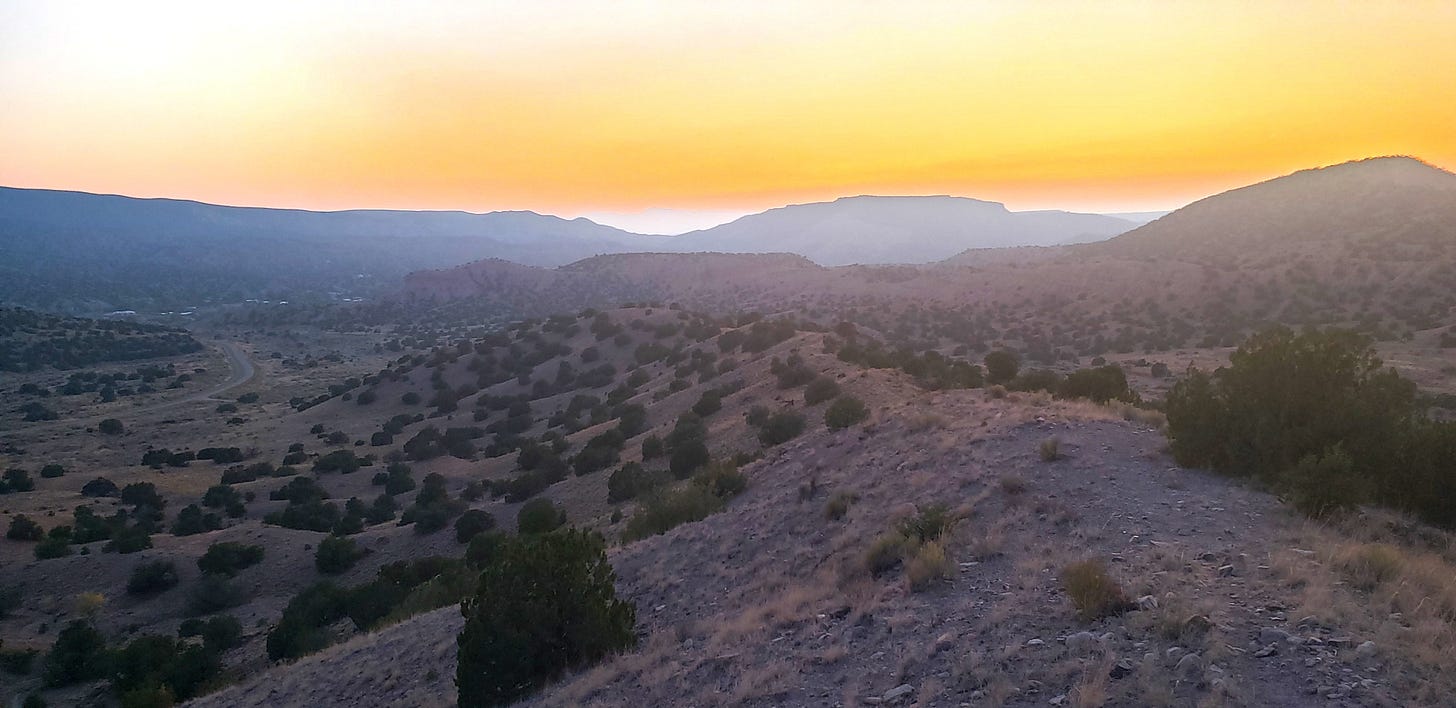As I drove north out of Santa Fe, my gaze fell on the massive rift valley opening to the north: a huge expanse of sage, Juniper-Piñon, and a shocking variety of landforms that faded brown to dusty blue, crowned with the gold of the horizon and the cerulean dome of sky. The Jemez mountains to the east and the Sangre de Cristo mountains to the west create the edges of this enormous bowl. This valley had held me for nearly six years and, after a year away, this was my first time back. In that moment, looking over the vast expanse of New Mexico, my many years there compressed into a single moment of remembrance.
I’ve heard that memory is more recreation than recollection—we are more creating the memory than passively recalling the past—then the variety of painful dislocations of my five years in New Mexico, the low point getting punched in the face by my partner, now looks like an odd sort of illumination. The years of therapy compress into outcomes: a step away from abusive relationships, my family of origin especially, and an opening to friendships with those who have my best interest in mind, most especially my relationship with myself.
Central to all of this was the therapeutic relationship where I began by stating unease with her opposition to people who treated me badly and ended with a profound loyalty to myself, still a work in progress. The magic of the universe can be disconcerting when it provides the same lesson, over and over again, through work relationships, neighbors, and people who used to be friends. Or maybe the experience is best described as repetition compulsion, the attempt to heal dysfunctional dynamics by recreating them.
In any case, my therapist introduced me to the idea of personality disorder, where people have a profound inability to access certain parts of themselves, cut off when caregivers are not emotionally or physically attuned during basic mammalian human development, especially at the precognitive years before around two or three years old.
Sometimes the infant or toddler unconsciously takes on the caregiving role for the parent, attempting to secure the mirroring that acts as basic sustenance for emotional and relational development. When such fractured people are inevitably confronted with these cut-off parts, they become violent as a way to protect against feeling out of control or powerless. Entire family systems grow up around these dynamics, perpetuating generational trauma by mechanisms familiar and unconscious. These psychological insights crystallized just as my own relational patterns reached their breaking point.
After 15 months in Albuquerque, my partner and I moved to remote northern New Mexico in the east mountains. The physical assaults escalated quickly then, and the final straw came when my son was in town and I felt he was not safe. The months after she was arrested and out of my life for good—court order—time compressed. I separated myself from my social network in this remote mountain village and learned that people with personality disorder tend to surround themselves with similar types.
I also had to step away from a job because of the principal working there and, most difficult and foundational of all, my parents. They loomed like the final boss and source of these patterns. My brother’s role was critical—discussed here.
After 39 years on earth, with thousands of hours of therapy, meditation, bodywork, and other healing modalities—as well as addictive behaviors and codependent relationships—my time lined up and I saw, clearly, back through to the beginning. This telescoping perspective layered my life decisions on a foundational template, a compression and simplification of time that, once addressed, acted as a fulcrum from the past to the future.
So, my recent view of the grand vista of New Mexico, my deeply challenging experience, was the simultaneity of five years of experience that compressed my entire life. A compression of a compression. I don’t have the physics or math to show it, but time does not seem linear. Memory does not seem a simple recollection. New engagement with relationships, especially foundational ones like self and family of origin, seems to reimagine both the past and the present, a summation that flattens reality and opens moments of choice and redirection.
I am fortunate to reschedule my time—stretching into the past and the future—away from betrayal, fear, and abuse. The friends I visited on this trip had witnessed my transformation, and we continued the relational work for new and healthy experiences based on loyalty, fidelity, and true good will. My visit served as a summation and expression of a fulcrum moment, an opportunity to literally define my time, in a universe where time does not seem linear and memory seems more than mere recollection.


